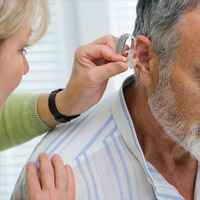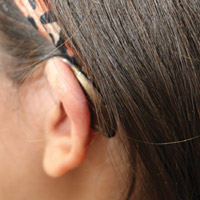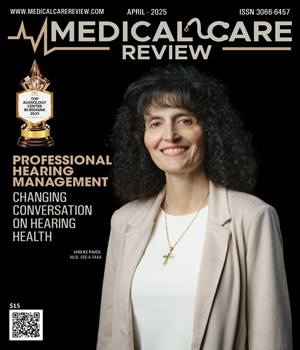Hearing loss is one of those things that creeps up on people. It’s gradual, often going unnoticed for years. The average person takes seven to ten years to acknowledge that their hearing isn’t what it used to be. By the time they do, they often assume a simple hearing aid will fix everything
But that assumption is part of a larger misconception about hearing loss and treatment—one that Vasilike Rauch, Au.D., CCC-A, FAAA, is determined to change. As the CEO of Professional Hearing Management, she has built her practice on a philosophy that stands in stark contrast to the transactional approach of many hearing aid providers.
“We’re not a hearing aid sales shop,” she states emphatically. “We are a treatment center. Every patient is different, and their hearing loss needs to be approached that way.”
For many patients, a quick fix isn’t the answer. At Professional Hearing Management, hearing care isn’t about selling a device—it’s about understanding the root cause of hearing loss and how it effects the brain, and offering comprehensive, long-term solutions. Under Rauch’s leadership, the practice has established itself as a treatment center rather than a hearing aid sales shop, offering comprehensive audiological evaluations, personalized care, and a commitment to improving patients’ quality of life and decreasing their risk of cognitive decline, falling and loss of independence.
Understanding Hearing Loss
Hearing loss isn’t as simple as turning up the volume. It involves complex interactions between the outer ear, middle ear, inner ear, and brain. Each part plays a role in processing sound, and when any part of this system breaks down, the ability to hear and understand speech diminishes and the consequences of untreated hearing loss include tinnitus, increased risk of cognitive decline, increased fall risk and increased risk of loss of independence.
We Need To Retrain The Brain To Process Sound Effectively, Especially For Patients Who Have Waited A Long Time To Seek Treatment
Why One-Size-Fits-All Hearing Solutions Don’t Work
Walk into any big-box store or browse online, and you’ll find a range of over-the-counter hearing devices. These amplifiers promise to enhance sound, but they’re far from an actual treatment. Many patients who come to Rauch’s office have already tried these devices and found them ineffective or even frustrating.
“They buy a hearing aid thinking it will solve the problem,” she explains. “But without understanding their hearing loss, and the complex relationship between the inner ear and brain, they often end up with something that doesn’t work for them. Then they toss it in a drawer, frustrated, and assume all hearing aids are useless.” These hearing loss patients then go years without treating their hearing loss which leads to auditory deprivation, a decrease in clarity and an increased risk of cognitive decline, falling and loss of independence.
Understanding the complex interaction between the ear and the brain is critical.

The impact of untreated hearing loss on a patient’s ability to remain independent can be significant. It can adversely affect the brain and gradually cause cognitive overload. Hearing loss causes the brain to work harder to decipher sounds. This increased cognitive effort exhausts resources devoted to other physiological functions like memory, decision-making and attention, leading to cognitive decline over time.
At Professional Hearing Management, every patient undergoes a thorough diagnostic process before any recommendations are made. The team doesn’t just rely on the standard “beep test” used by many hearing care providers. Instead, they conduct a full range of evaluations, including:
• Speech clarity testing in quiet and noise
• Middle ear function tests
• Cognitive screenings
• Lifestyle and environmental assessments
• Outer hair cell testing
• Extended high frequency testing
The results of these tests allow Professional Hearing Management to tailor a treatment plan for each patient. And sometimes, that treatment doesn’t involve a hearing aid at all. The clinic also provides cognitive training exercises, akin to physical therapy for the brain. These exercises are designed to improve clarity and comprehension, particularly for patients who have gone years without adequate sound stimulation
“Advanced hearing aids are amazing, but they’re not a magic fix,” Rauch notes. “We need to retrain the brain to process sound effectively, especially for patients who have waited a long time to seek treatment.”
Not Everyone Needs a Hearing Aid—and That’s Okay
One of the most common surprises for new patients at Professional Hearing Management is learning that hearing aids aren’t always the best first step. Although permanent hearing loss is a progressive degenerative disorder, some types of hearing loss are caused by medical conditions, blockages, or issues in the middle ear rather than the inner ear.
When that’s the case, surgery or medication may be the solution, not a hearing aid. Rauch recalls a recent patient who came to her clinic after being fitted with hearing aids elsewhere. “She told me she still couldn’t hear well, even with the devices,” Rauch says. “After running tests, I realized most of her hearing loss was caused by an issue with her middle ear bones. I sent her to a neurotologist, and after a surgical procedure, she didn’t even need hearing aids.”

These cases are common, yet many patients never receive a proper diagnosis before being given hearing aids. “It’s like trying to correct vision by grabbing a random pair of glasses and hoping for the best,” Rauch says. “That’s not how hearing works.”
In addition to surgical options, some patients benefit from medical treatments, such as steroid injections for sudden sensorineural hearing loss or medications that address inner ear inflammation. “The key is knowing when hearing aids are appropriate and when another intervention is the better choice,” Rauch explains.
The Role of Cochlear Implants
For patients with severe to profound hearing loss, traditional hearing aids may not be sufficient. In these cases, PHM offers cochlear implant evaluations and programming. Rauch is passionate about ensuring that patients who could benefit from cochlear implants are aware of this option.
“Too often, patients are told to keep trying new hearing aids, even when their inner ear damage is too severe for these devices to help,” she says. “A cochlear implant can be lifechanging for these individuals.”
-
We’re Not A Hearing Aid Sales Shop. We Are A Treatment Center. Every Patient Is Different, And Their Hearing Loss Needs To Be Approached That Way
She recounts the story of one of her first patients in Valparaiso, Indiana, who had struggled with severe hearing loss for years. Despite purchasing multiple hearing aids, his clarity of speech was virtually non-existent. After a comprehensive evaluation, Rauch determined that he was a candidate for a cochlear implant. Following the surgery and months of auditory training, his speech clarity improved dramatically— from zero to over 80 percent.
“Seeing the joy on his face when he could hear and understand speech again was incredibly rewarding,” she recalls. “It’s moments like these that remind me why I do what I do.”
Expanding Services to Meet Growing Needs
Professional Hearing Management continues to grow as one of the few clinics in Northwest Indiana offering cochlear implant services. But Rauch has even bigger plans for the future.
“I’d love to bring back balance testing and electrophysiology to allow for more diagnostics,” she says. “But first, I need to find the right provider to help expand our team.”
Currently, her schedule is fully booked with tinnitus patients, another area where she hopes to expand services. Tinnitus, defined as the perception of a phantom sound, most often occurs as the neural connections between the ear and the brain are damaged; be it from age, noise exposure, common medications, etc. “Tinnitus can be life-altering,” she explains. “We want to provide even more resources to help people treat it effectively.”
One major upcoming initiative is virtual hearing health programs, where patients can receive remote support, counselling, and a cognitive training exercises from the comfort of their homes. “We want to make hearing healthcare more accessible, especially for patients who struggle with mobility or live in rural areas,” Rauch says.
Committed to Offering the Best Possible Hearing Solutions
At the heart of Professional Hearing Management is a commitment to patient care that goes beyond the transaction. From the front desk to follow-up appointments, every patient receives personalized attention and compassionate care.
“What we do here isn’t just about hearing—it’s about reducing chances of cognitive decline, restoring connections and improving quality of life,” Rauch says. “Seeing a patient light up when they hear their grandkids for the first time in years—that’s what makes this work so rewarding.”
As technology continues to evolve, so does Professional Hearing Management’s commitment to offering the best possible hearing and tinnitus solutions. Whether through advanced diagnostics, cutting-edge treatments, or simply taking the time to educate each patient, the practice remains dedicated to one goal: helping people hear and communicate their best and reduce their chances of decline.
As Rauch aptly puts it, “Our mission is to help people hear and communicate the best they can and to decrease their risk of cognitive decline, falling and loss of independence. And that’s a mission we take to heart every single day.”
Company : Professional Hearing Management
Headquarters :
.. ManagementDr. Vasilike Rauch, Au.D., CCC-A, FAAA, CMPE, and CEO
Thank you for Subscribing to Medical Care Review Weekly Brief





